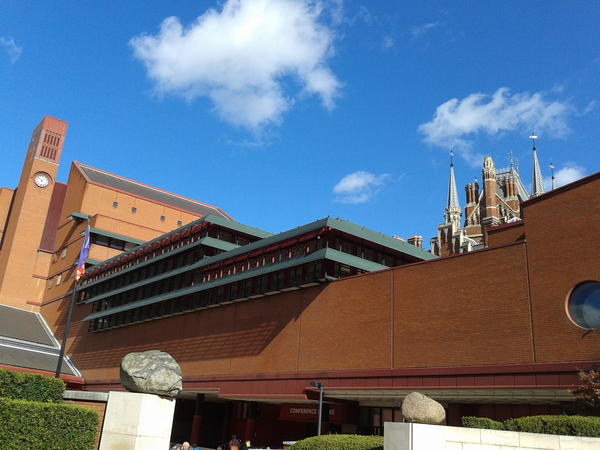Wikipedia can be a really great resource; who hasn't Googled an unknown fact, and clicked on the first link to find out more? Inevitably, that first link will be from Wikipedia. Which is fine, so long as we never admit to it in a professional or academic setting.
 |
| Photo: Jo Taylor. The British Library - just as proof that the sun has shone a bit this year. |
On Friday afternoon, I attended the AHRC's Wikipedia workshop, run by Andrew and held at the British Library. It aimed to introduce arts and humanities researchers into the somewhat daunting arena of Wikipedia contribution. As well as an overview of the history of Wikipedia, and providing a sense of the project's immense scale in 'real', numerical terms, the workshop helpfully guided us Wiki-beginners through the process of constructing a profile, engaging with other users and contributing our own knowledge to that vast compendium of knowledge, useful and otherwise. Several issues were thrown up: the construction of that all-important online identity; communicating (nicely) with our fellow Wikipedians; and disseminating our own research in that increasingly-important public-friendly manner.
The online identity is an issue well explored by several others (see, for example, this Guardian article or this post by Charlotte Mathieson), and all that should be added to these already great discussions is a reminder (and one stressed throughout the workshop) that Wikipedia is completely open access - so, if you're going to use a name identifiable with your real one, make sure that you're happy for anyone and everyone (including potential employers and funders) to read your contributions. Even if you delete something later, the action will be visible in the site's easily accessible history. If that sounds scary, it should; to quote an old cliché, everything you say can and will be used against you.
 |
| A screen-grab of the edit history page of Samuel Taylor Coleridge's Wikipedia entry. |
Anyone wondering who actually cares about their research, head to Wikipedia; you may be surprised by who is already engaging with your area of interest. And if no-one is already, make a page - they soon will be.
Hy bro!! Who are u,,,!!! Thx 4 information. Visit back my blog at http://lukyhacked.heck.in/suarasepakbola-com.xhtml tempatnya prediksi bola terakurat
ReplyDelete